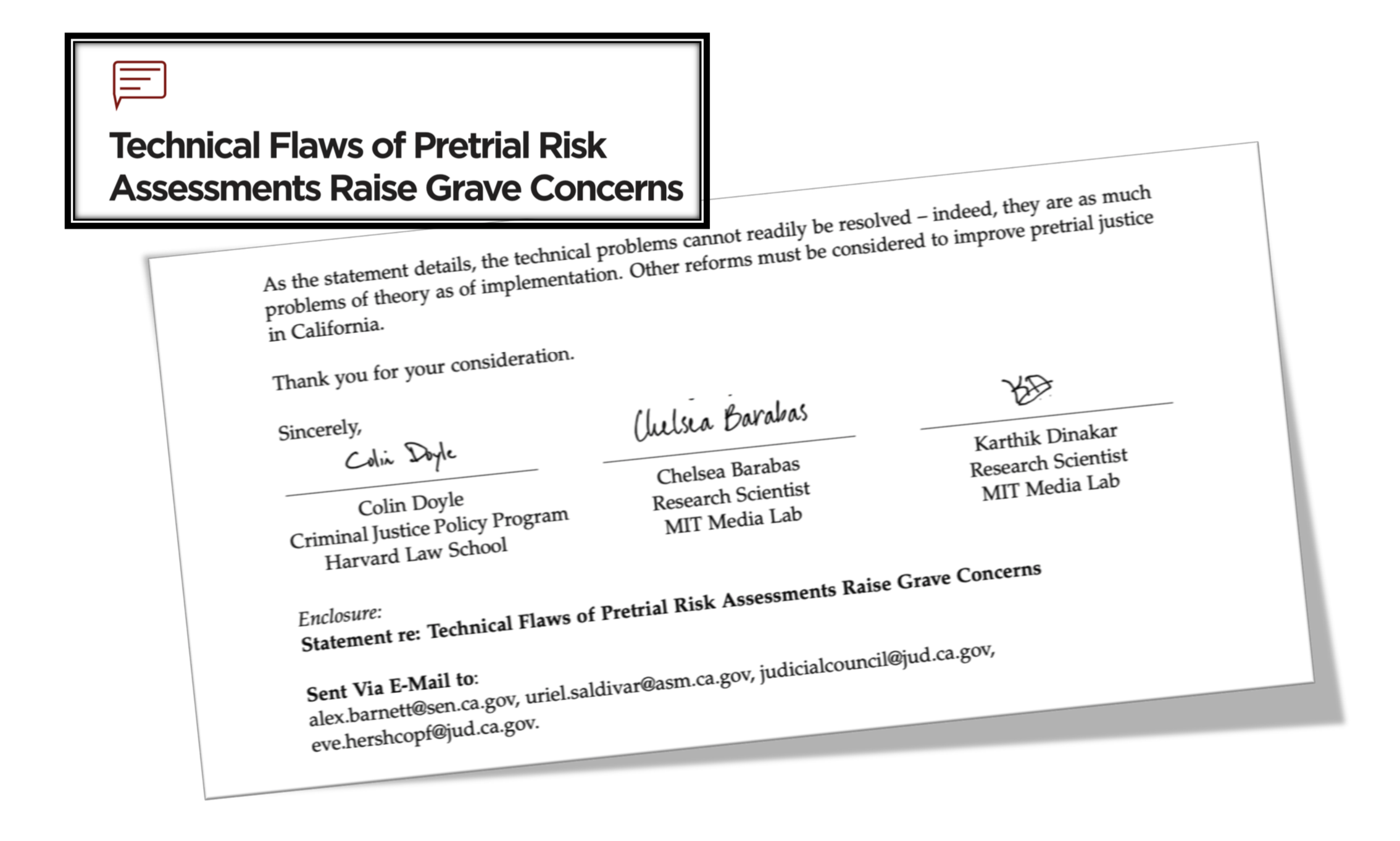
End Pretrial Risk Assessment Tools Say Twenty-Seven Prominent Researchers from Columbia, Harvard, MIT, Princeton, UC Berkeley, and NYU
In a publication date July 17, 2019 entitled Technical Flaws of Pretrial Risk Assessments Raise Grave Concerns, twenty-seven prominent researchers encourage the end of the use of pretrial risk assessment tools as some version of bail reform and call instead for policy-makers to look to other reforms instead.
RELATED: Technical Flaws of Pretrial Risk Assessments Raise Grave Concerns
Said the shared statement:
Actuarial pretrial risk assessments suffer from serious technical flaws that undermine their accuracy, validity, and effectiveness. They do not accurately measure the risks that judges are required by law to consider. When predicting flight and danger, many tools use inexact and overly broad definitions of those risks. When predicting violence, no tool available today can adequately distinguish one person’s risk of violence from another. Misleading risk labels hide the uncertainty of these high-stakes predictions and can lead judges to overestimate the risk and prevalence of pretrial violence. To generate predictions, risk assessments rely on deeply flawed data, such as historical records of arrests, charges, convictions, and sentences. This data is neither a reliable nor a neutral measure of underlying criminal activity. Decades of research have shown that, for the same conduct, African-American and Latinx people are more likely to be arrested, prosecuted, convicted and sentenced to harsher punishments than their white counterparts. Risk assessments that incorporate this distorted data will produce distorted results. These problems cannot be resolved with technical fixes. We strongly recommend turning to other reforms.
Of course, the report also noted a number of other flaws besides technical flaws that undermine the New Camelot of the new pretrial risk assessment era, driven primarily by Cherise Fanno Burdeen and her pals down at the Pretrial Justice Institute:
Beyond the technical flaws outlined in this statement, a broader and growing body of research questions the validity, ethics, and efficacy of actuarial pretrial risk assessments. For example, most risk assessments are proprietary technology, and defendants assessed by these tools are not allowed the opportunity to inspect and critique the algorithms or their underlying data. Poor implementation and lack of judicial training and buy-in can undermine reforms. Validity and fairness questions arise when tools are trained on data from one jurisdiction but deployed in a jurisdiction with different demographics, judicial culture, and policing practices.
Cherise Burdeen of the Pretrial Justice Institute
Interestingly, the researchers sent letters to three specific jurisdictions who are currently considering pretrial risk assessments urging them to change course: (1) California Senator Hertzberg and staff of the Chief Justice and State Courts in reference to the passage of Senate Bill 10 and the duty of the Supreme Court to regulate the risk assessments; (2) the County of Los Angeles; and, (3) the Missouri Supreme Court. In each letter, they noted that, “As a result, pretrial risk assessments do not increase the likelihood of better pretrial outcomes, much less guarantee them.”
Download the Statements…
California – County of Los Angeles
Missouri – Supreme Court of Missouri
The self-proclaimed pretrial ninja’s over at the Pretrial Justice Institute are now trying to tap-dance their way out of this as we have noted since last year. The genie is now out of the bottle, and it is not going back in. For years Burdeen and PJI, along with others, advocated that these tools should “replace money bail,” meaning the results of the tool would decide who stays in jail and who gets out. As recently as last month, the Pretrial Justice Institute’s Cherise Fanno Burdeen, who has been supporting risk tools for over a decade, took to defending the results of a risk assessment tool in New Orleans when the City’s own study called it faulty.
We can say with certainty that the Pretrial Justice Institute’s plan of 3DaysCount, which many states adopted, is fatally flawed for two reasons: (1) computers don’t make the system better, and, (2) denying the right to bail in favor of preventative detention weights the scales of justice too heavily in favor of the government and political forces to expand preventative detention when the right to bail would otherwise keep in check that expansion. In fact, the 3DaysCount platform advocated by the Pretrial Justice Institute since 2015, advocates for changes in state constitutions to eliminate the right to bail so that state “constitutional changes can allow for preventive detention based on assessed risk,” ostensibly referring to using risk assessments as the central gatekeeper for preventative detention. 3DaysCount also advocates for implementing “statewide evidence-based [pretrial risk assessment] tools.”
We have long opposed this risk assessment/detention movement for longer than Burdeen and her pretrial ninja’s have promoted it because the right to bail creates a check on the government’s power yet allows judges to achieve a delicate balance involving the rights of the defendant, interest of the People, and the rights of the victim of the crime. To instead give the government absolute and greater power to detain using a computer program has always been nothing more than some panacea and frankly a non-solution to the issues people have with the criminal justice system. We have shown that this thinking was the essence of the Federal Bail Reform Act of 1984, which has proven not to decrease mass incarceration but instead to triple pretrial incarceration.
It is now time to turn to some solutions that might actually work and make the system better. It is time for the 4th Generation of Bail Reform in America.



Facebook Comments